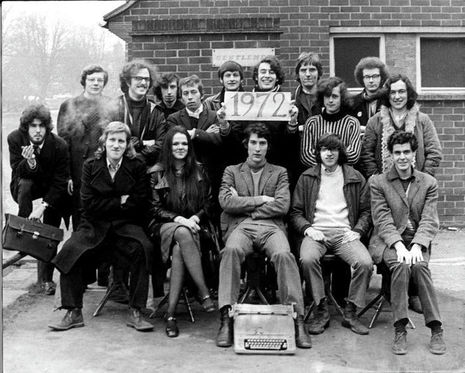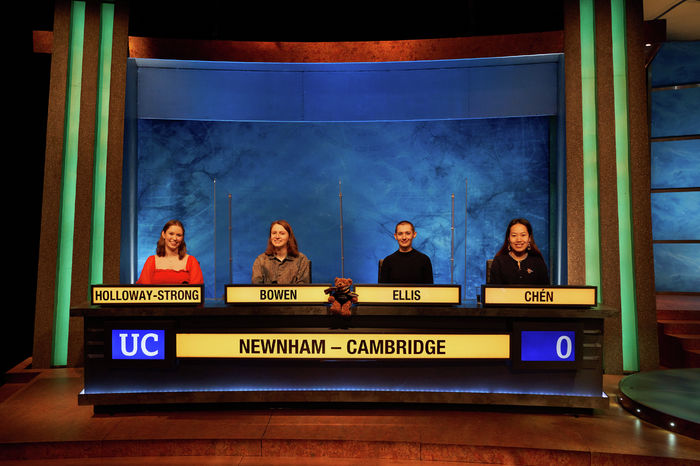The BBC’s own University Challenge
Does the Beeb hire too many Oxbridge grads?

It’s the start of October 2021 and my hands are trembling as I type. I’m frantically texting my mum, my dad and two friends from home to let them know I’m sat opposite Michael Kohn.
In case your Monday nights aren’t punctuated with the opening music of University Challenge, Michael Kohn is something of a University Challenge legend. He’s up there with giants like Monkman, Loveday and Rout.
Kohn was the captain of Imperial College London in Season 50, and wowed audiences with his impressive breadth of knowledge spanning maths, literature and jazz. Much to my excitement, he decided to study for a masters at Pembroke College, Cambridge in 2021.
The competition of University Challenge goes well beyond the TV screen. Each week, “Swansea, Robinson” (Dad), “Bangor, Williams” (Mam) and I (“Pembroke, Robinson”) battle it out, usually with minimal success.
The show has recently been subject to a series of complaints in the latest debacle regarding the BBC’s adherence to its impartiality rules. At the end of March, the BBC was accused of breaking its impartiality rules by “rigging” the popular show University Challenge in favour of Oxford and Cambridge.
Frank Coffield, an emeritus professor of education at University College London criticised the BBC for hiding the true extent of its Oxbridge bias after his freedom of information request to reveal how many Oxbridge teams have featured on the show, was denied.
Coffield’s complaints centre around how each of the Oxbridge colleges are allowed to compete in the programme despite having as few as 300 students, while much larger civic universities such as Manchester and Birmingham, with around 40,000 students, are allowed only one entry each.
“The BBC was accused of ‘rigging’ the popular show in favour of Oxford and Cambridge.”
In his view, the show’s format treats “all other universities in the UK apart from Oxbridge as second class ... the balance is grotesque, inequitable and indefensible.” Coffield has since urged the National Union of Students to boycott the competition in protest.
The BBC defended the format of the show, arguing that all higher education institutions which deliver courses at the level of bachelor’s degree or equivalent are welcome to apply, stating that the show is “not limited to Oxbridge colleges” but includes around “300 colleges of further and higher education across the UK”.
Complaints about the programme’s format are not new. In 1975, back when the programme was on ITV, a team from Manchester University staged a protest in the final round of the show against Downing College, Cambridge. They answered “Che Guevara”,“Karl Marx”, “Trotsky”, or “Lenin” to every question in a bid to make the show unbroadcastable and so bring attention to the Oxbridge bias of the show.
Nearly 50 years on, their argument still stands. Across the show’s 51 finals to date, only 11 have been between non-Oxbridge institutions, most recently last year when Imperial College London went head-to-head with the University of Reading. In this year’s series, eight of the 28 teams are Oxbridge colleges.
The format of University Challenge is only the tip of the iceberg when it comes to the BBC’s so-called “Oxbridge bias”. When Amol Rajan joins the show later this year, all three of the programme’s presenters will all have been Cambridge-educated. A quick Google search tells me that ten out of the past 14 Director-Generals have been educated at Oxbridge, including the two most recent, Tim Davie and Tony Hall.
Only a few weeks ago, the BBC dedicated over three hours of coverage on a mainstream channel for the annual Oxford v Cambridge boat race. The Boat Race has been broadcasted on the BBC for over 80 years, and it’s the only University-level sporting event which receives national coverage.
“Of 51 finals to date, only 11 have been between non-Oxbridge institutions”
The real “University Challenge” for the BBC is in recruitment. In 2020, Davie recognised how “socio-economic diversity, different types of people, different voices” was a “big issue” for the BBC. Davie pledged to recruit staff from wider backgrounds than Oxbridge, in a bid to “modernise” the over 100-year-old corporation.
The BBC’s most recent diversity & inclusion plan sets out the corporation’s commitment to create an organisation which “reflects more accurately the society we serve”. The report details a “50:20:12” plan, aiming to have a staff body and leadership with a gender balance, with at least 20% from BAME backgrounds, and 12% with disabilities.
The plan also claims that the BBC “plans to build our socio-economic diversity” – but fails to include socio-economic background within its targets, as nearly 50% of staff at the BBC have chosen not to declare their background.
The rule that the colleges of Oxford and Cambridge enter individually on University Challenge dates back to 1962, when the programme was first devised.
In the past 60 years since then, the BBC has come a long way in diversifying its output and workforce. The archaic format of University Challenge needs to change if it is to align with the BBC’s commitments to diversity.
The BBC needs to be more transparent in how it selects teams for the show, and, on a broader level, in how it selects graduates to join its workforce. In the words of Jeremy Paxman: “Come on, let’s have an answer. Let’s have it please.”
 News / Cambridge academics stand out in King’s 2026 Honours List2 January 2026
News / Cambridge academics stand out in King’s 2026 Honours List2 January 2026 Interviews / You don’t need to peak at Cambridge, says Robin Harding31 December 2025
Interviews / You don’t need to peak at Cambridge, says Robin Harding31 December 2025 Comment / What happened to men at Cambridge?31 December 2025
Comment / What happened to men at Cambridge?31 December 2025 Features / “It’s a momentary expression of rage”: reforming democracy from Cambridge4 January 2026
Features / “It’s a momentary expression of rage”: reforming democracy from Cambridge4 January 2026 News / Varsity’s biggest stories of 202531 December 2025
News / Varsity’s biggest stories of 202531 December 2025










